Is it safe to donate blood? This is the first question that comes to mind when we see messages requesting for blood donors, especially when COVID-19, masking up and social distancing are still actively being talked about.
During the COVID-19 lockdown, regular donors were avoiding hospitals and blood banks, fearful of catching the virus. There were understandably fewer blood donation camps organised. Most blood banks were running on reserves.

Mumbai’s daily blood requirement pre-COVID was about 1,000 units per day. During COVID, with fewer surgeries demand dropped but it’s returning to those pre-COVID levels. The 50-odd blood banks in the city usually have a stock of about 5,000 units but are currently at about 3,700 units. The situation of shortage persists, not only in Mumbai, but all over India. Every day 12,000 people in India die due to the sheer lack of donated blood.
Read more: As Chennai faces an acute shortage of blood, here’s what you must know
Indians hesitate to donate blood
Before COVID-19 itself, Indians have never been generous with their blood, and mostly donated only in emergencies or when required by someone known. The WHO recommends that a country have blood reserve units equal to 1% of its population. At the national level, India was short of 1.9 million units of blood, as per data presented to the Lok Sabha in March 2018. Recent figures are likely to be worse.
In May 2020, during the first lockdown, Lions Club of Lokhandwala Township, Kandivali East in collaboration with Prince Aly Khan Hospital, conducted a blood donation camp. In these early COVID-19 times, PPE was the norm and all social distancing precautions were in place. They collected 31 units of blood from a residential area of over 10,000 households, and where the collection centre was walking distance for everyone.
One of the volunteers mentioned that even pre-COVID, such blood donation camps were held in the township twice a year only, because all that they managed to get were about 100 units of blood per year. A sad reflection of the national sentiment towards blood donation.
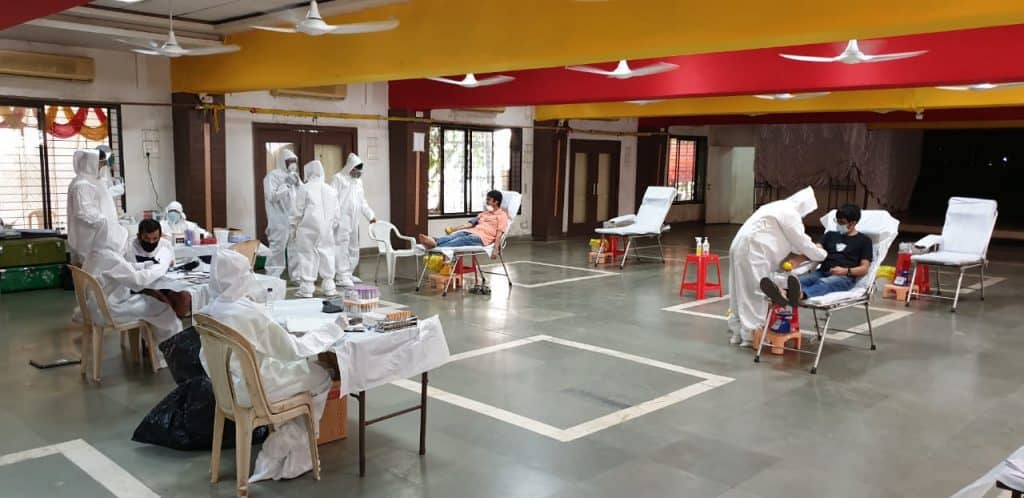
The same Lions Club conducted another camp in collaboration with Wamanrao Oka Blood Center in August 2021. A mobile blood donation van was used for the purpose. Only 26 units of blood were collected. “In rural areas more people come for such blood donation camps but in the city we really struggle to convince people to come forward”, said Seema Agarwal, from the organising team.
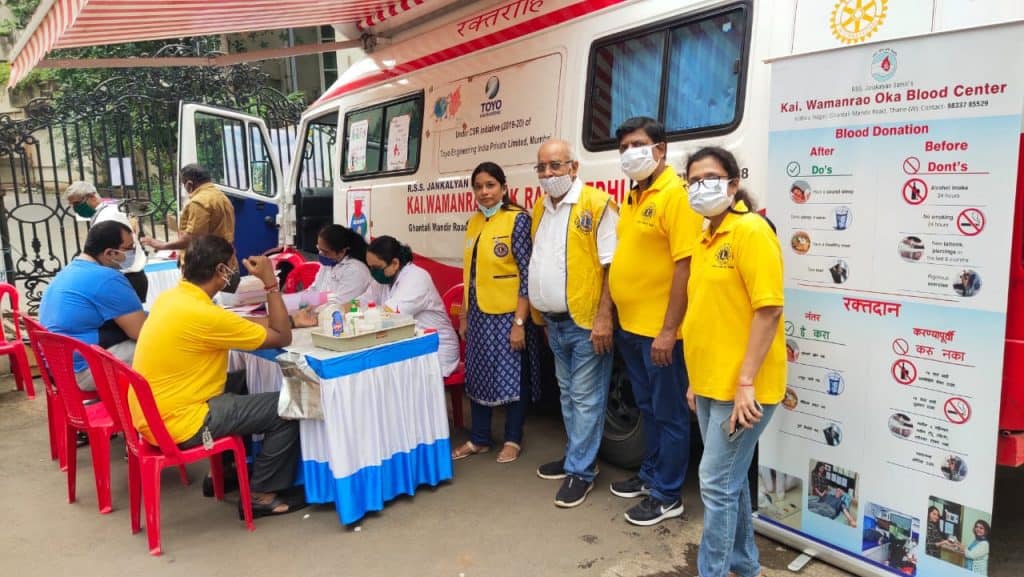
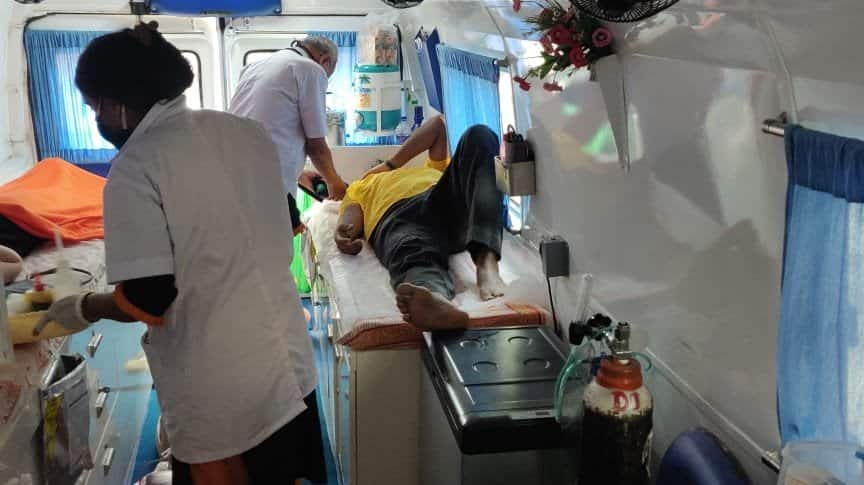
Appeals for blood donation
Seema’s sentiments are echoed by others. A few weeks ago, Dr CS Pramesh, Director of Tata Memorial Hospital, put out a desperate message on Twitter asking for blood for patients suffering from cancer at the hospital. Certain types of cancer and stages of treatment need regular blood transfusions, without which the patients struggle. A lot of energy and resources (of both the patients’ families and the hospital) get spent in efforts to get the blood when it is required. The hospital requires about 60 units of blood every day. The hospital said its team would be quite happy to visit societies to collect multiple units of blood in one shot.
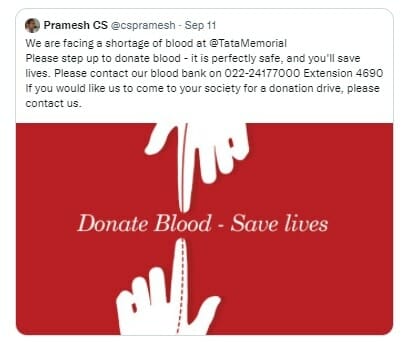
In response to Tata Memorial’s request, a blood donation camp was recently held at the township, organised by Vishwas NGO and supported by several local groups. One of the volunteers who was working behind the scenes admitted that he was unsure about how many people would turn up, given the past collections. After two weeks of earnest campaigning, they collected about 150 units of blood in a single day. Almost as many people who wished to donate were rejected due to low haemoglobin, inadequate body weight, fasting, and other reasons. It was indeed a great achievement to have had so many people come forward.
Aditya, a teenager from the locality who donated blood said, “I actually wasn’t interested in doing this but my friend convinced me that it was required. I am happy to have donated my blood that will save lives. It was so easy to do. I didn’t even have to travel. And it wasn’t scary as I thought it would be. No pain or anything.”
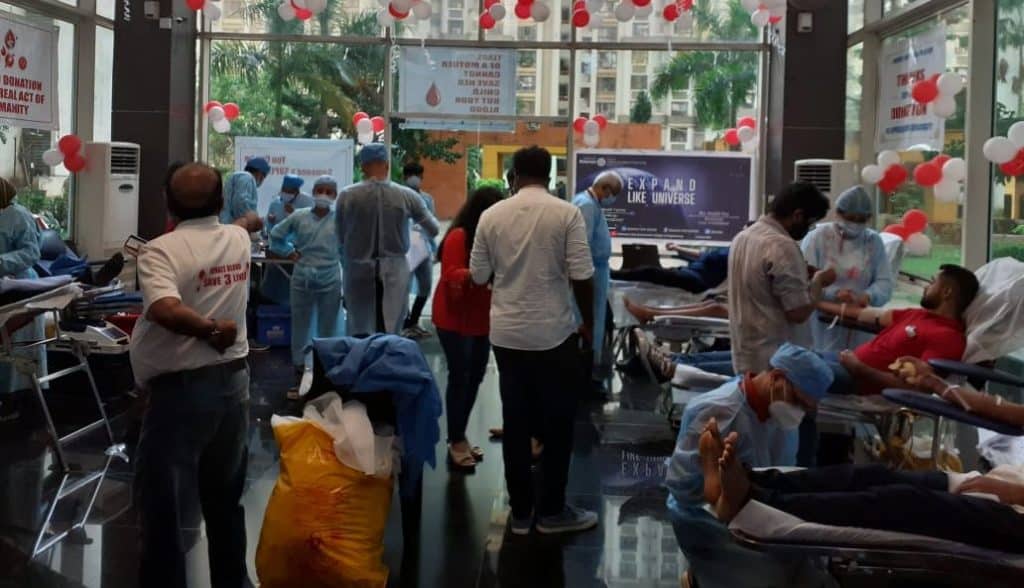
Who can donate blood?
According to the government’s National Blood Transfusion Council, any healthy adult can donate blood. Men can donate safely once in every three months while women can donate every four months.
Those who have taken COVID-19 vaccinations can donate 15 days after taking the shot, but if there are no constraints, it makes good sense to donate blood before getting the vaccination itself.
A donor needs to fulfil the following criteria:
- Age 18-65 years (sometimes restricted to 60 years)
- Weight minimum 45 kg
- Normal body temperature, pulse, blood pressure and oxygen level
- Haemoglobin not less than 12.5 grams
- Eaten in the last 4 hours
- Mothers – delivered at least a year earlier and not lactating
- Not have had tattoos, piercings, acupuncture in the last 12 months
- Not have had any surgery in the last 6 months
- Not have had malaria in the last 3 months (3 years in endemic areas)
- Not have had dental treatments in the last 3 days
- Immunization & vaccination – not have had vaccination for any of the following in the last 15 days – COVID-19, cholera, typhoid, diptheria, tetanus, plague, gammaglobulin; rabies vaccination in last 1 year
- Not be on intravenous insulin
- Not have had any of the following illnesses/infections: Heart disease, Cancer, Hepatitis B or C, Tuberculosis, Leprosy, HIV, Epilepsy, Asthma on Steroids, Bleeding disorders, Thalassemia, Sickle Cell Anemia, Polycythemia Vera
- Never taken drugs intravenously
- Not taking certain medications – to be ascertained on a case to case basis.
Will donating blood harm me in any way?
No – except for a poke and some exercise restrictions. Not to forget the 30-60 minutes of your time that you also donate to make this happen.
When you donate blood, the blood needs to be drawn out of your vein, usually the vein on your inner elbow. This requires a large needle to be inserted and that’s when you would feel some pain. Drawing of blood is painless but after the needle is removed, you may feel some discomfort at the needle entry point, similar to when blood is drawn for blood tests. Utmost care is taken to ensure that everything (your arm, the needle, the tube, etc.) is sterile, so there is no risk of infection.
After donating blood, it takes about 500 calories of food to replace it. So you should avoid burning calories (no exercising for a day) and you need to eat well and drink lots of water. [That’s why you get a sweet drink and biscuits after you give blood.] Within 48 hours, your blood volume will be restored.
What are the benefits of donating blood?
- Every blood donation of 350-450 ml can save up to three lives. This is sure to make you feel happy and useful! There is no substitute for human blood and the only factor that differentiates one human from another is the blood group. Blood is used whole or separated into its components – red cells, platelets and plasma that can be used individually for patients with specific conditions.
- You save time, energy and resources of the families of the beneficiaries. Apart from emergency blood needed due to accidents, sudden illness and surgeries, there are many people who need blood regularly – such as those suffering from cancer, thalassaemia, myelodysplastic syndrome and illnesses that cause anaemia and platelet drop. Having blood in reserve brings immense peace of mind.
- When you go to donate blood, you are put through a short physical examination. Basic parameters are checked and this may uncover some need for medical attention. One of the most common discoveries is low haemoglobin.
- If you are otherwise healthy but your haemoglobin is too high (15+ for females, 17+ for males), donating your blood reduces its viscosity, which prevents clots. This is a natural way of managing high haemoglobin.
I’m convinced! So where can I donate blood?
Many blood banks/hospitals would be happy to help in organising drives in your areas. You can also donate at a blood bank as an individual.
There are over 50 blood banks spread across Mumbai, some attached to hospitals and others standalone. Here are a few:
- Tata Memorial Hospital, Parel – 022-24177000 Extn 4690 (currently they are looking to organise drives in societies)
- Prince Ali Khan Hospital Blood Bank, Mazagaon – 022-23777934, 9821035341
- Nair Hospital, Mumbai Central – 022-23027645, 9820887694
- Borivali Blood Bank, Borivali West – 022-28936203, 9821052413
Look for blood banks in your locality on Blood-bank.in here.
This explainer is part of a series on ‘Explainers and Information Resources for Mumbaikars’ supported by a grant from the A.T.E. Chandra Foundation.